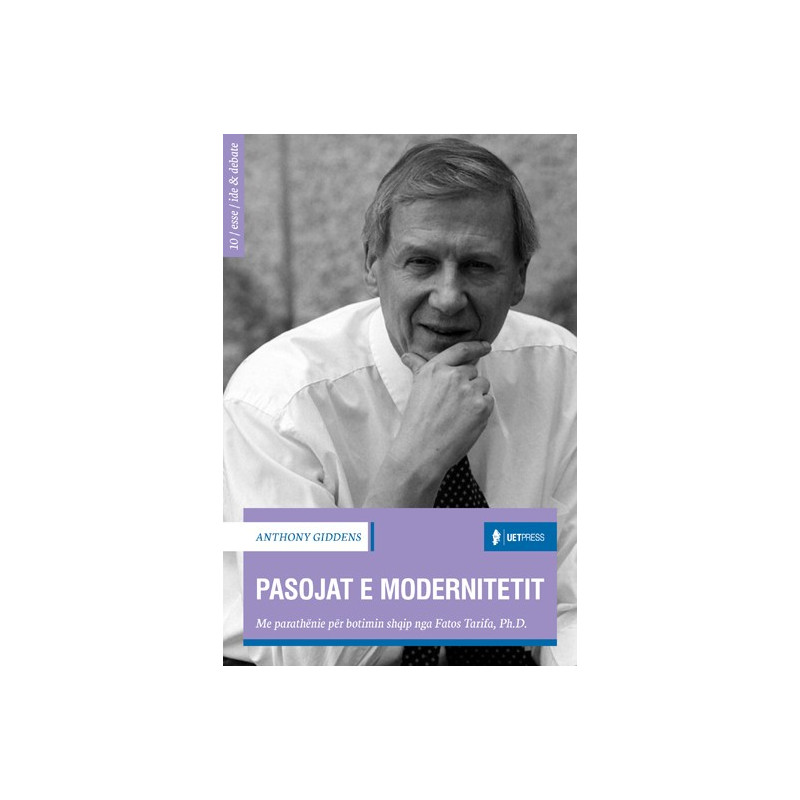
Reference: 2804
Reference: 2804
Reference: SKU001694
Publisher: Vellezerit Tafa
Reference: SKU000001
Publisher: Mitrush Kuteli
Reference: SKU001740
Publisher: UET Press
Reference: SKU000660
Publisher: Onufri


Our efforts to explain the nature are interconnected with the efforts to explain the society and vice versa. The concepts, being an element of reflection between knowledge, become part of their connection and enrichment.
Title: Pasojat e modernitetit
Original: The Consequences of Modernity
Category: Social sciences
Author: Anthony Giddens
Albanian translator: Grup Autorësh
Publisher: UET Press
Year: 2013
Pgs. 209
Weight: 0.271 kg.
ISBN: 978-99956-39-67-9
Many of us who claim to know something about natural sciences conduct the debate over space-time and their correlation by fronting the views of Aristotle with those of Newton or the ones of Einsteins' with Hawking's. Despite the fact that a diversity of arguments are brought up in a debate and, being conscious, that each of the aforementioned historic characters lived in different times and spaces (excluding Newton and Hawking separated only in time), the substance, more or less, is always this: Do space and time form a static scene where events occur and which is not influenced by what is happening in there, or a dynamic scene where not only the force or event configure the space-time, but also space-time itself affects the action of the force or course of the events.
Our efforts to explain the nature are interconnected with the efforts to explain the society and vice versa. The concepts, being an element of reflection between knowledge, become part of their connection and enrichment. Anthony Giddens, author of "The consequences of modernity", brought in Albanian language by UET Press, holds that connecting the concept of space and time is as important as it is to natural sciences, but from another perspective.
With respect to natural sciences, the future and the past, which consist of the two values of the time variable in the Cartesian space-time system, are not distinguishable, whereas in social sciences, Giddens reminds that the situation is different: we remember only the past (what is behind) meanwhile the future (what is ahead) can only be pictured. It is subject to his argument the new relation established between space and time and, through several factors, he persuades us that one way to explain the transition from pre-modern societies to modern societies is based exactly on this different and very dynamic relation existing between space and time.
In an elegant and selective manner of picking and presenting facts, Giddens shows that in pre-modern societies no one could tell the time of the day without making reference to other socio-space signs: "when" was universally linked either to "where" or identified through a natural disaster. From his viewpoint, the more the time is distanced from space, the more "modern" the society is.
To support this argument, the author lists all initial conditions which enabled, step by step, this distance: invention of the calendar and watch, development of post services and maps, emerge of internet and banks. Each of them influenced in such a way that the social life, with linked time and space coordinates in pre-modern societies, could be planned and developed in undetermined spaces, encourage geographically distant relations with not even an opportunity of a face to face interaction between the "others".
Giddens is very clear when explain "why is the separation of time and space so crucial to the extreme dynamism of modernity": 1. It is the prime condition of the processes of disembedding. 2. It provides the gearing mechanisms for that distinctive feature of modern social life, the rationalised organisation. 3. The radical historicity associated with modernity depends upon modes of "insertion" into time and space, unavailable to previous civilizations. These singularities which distanced time from space and brought progress and modernity, refer Giddens, are an appeal for modifying our ways of thinking around it.
While searching to elaborate a broader theory on modernity, the author emphasis the consequences brought about by this new order in social relations and institutions, as well as in eradicating and making more dynamic their distribution. According to him, we live in a world where these developments create not only more opportunity and safety but also are a reason for damaging the environment or source of disconcerting policies on strengthening military weapons.
By contrast, the author aims at re-focusing the object of its sociological studies not only towards what, but also to why, hence being at the same time a sociologist, analyst, philosopher and technician.
By quoting Wittgenstein, not only does Giddnes mind the "language", but he follows the classics of the seventeenth and eighteenth centuries by basing his work on exact science principles and simultaneously, referring to the sociologist scholars in terms of comparison, while expressing also his own opinion in favor or against. This book triggers not only a limited group of professionals and philosophers, but the public at large.
Short guide in Albanian on how to order books in 4 easy steps
Download (292.13KB)
Publisher: Pema
Publisher: Te tjere
Publisher: UET Press
Publisher: Minerva
Publisher: ISP & DITA 2000
Publisher: Fan Noli
Publisher: Fan Noli
Publisher: Pika pa Siperfaqe
Publisher: Dritan Tirana
Reference: SKU001466
Publisher: LIRA
Reference: SKU001510
Publisher: Papirus
Publisher: Papirus

Our efforts to explain the nature are interconnected with the efforts to explain the society and vice versa. The concepts, being an element of reflection between knowledge, become part of their connection and enrichment.
check_circle
check_circle